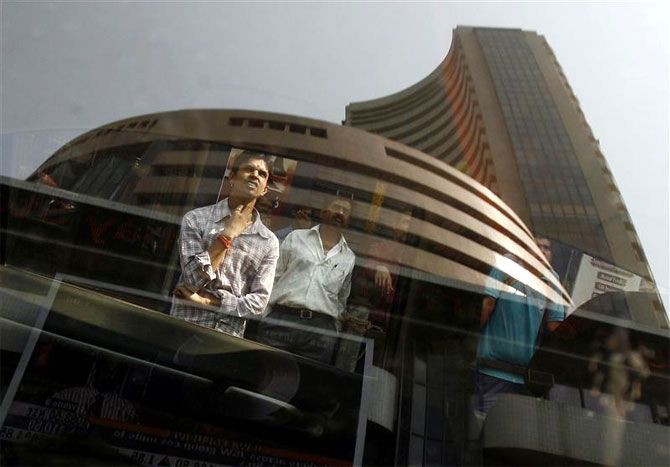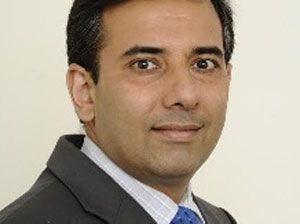Kapil Bali (bottom, left), CEO, YES Securities India shares his thoughts with Puneet Wadhwa on the road ahead for the markets and the sectors that should gain with an improvement in the economy. For investors who are willing to remain invested for two – three years, there exist quite a few good opportunities, he says. However, there are policy related risks as well, he cautions. Excerpts:

What is your reaction to the developments in Greece? How much of an impact do you think it will have on the emerging markets?
We believe that investors worldwide are keeping a close eye on the events in Greeceas they fear that a possible ‘Grexit’ could trigger a contagion effect in the zone with larger countries like Spain and Italy succumbing to the pressure. While these fears are certainly justified, however, we believe that they are already priced in by the markets as these fears have been around for a while.
As far as India is concerned, any sharp selloff in the global markets would certainly extend to our markets as well. However we are relatively in a sweet spot as compared to the other countries.
There is an expectation of economic recovery driven by measures to strengthen infrastructure, smoothen out supply chain bottlenecks; all driven by the Government which is trying to come up and enact reforms that would be conducive to the economic and capex recovery. And as such the expected benefit of this recovery for corporate India is what is driving institutional investors’ interest in the country. Therefore investor funds should return to the country and the markets over time.
 How do you see the Indian markets playing out over the next few quarters and how much bad news are they factoring in as regards global and domestic headwinds?
How do you see the Indian markets playing out over the next few quarters and how much bad news are they factoring in as regards global and domestic headwinds?
In the near-term, we believe that the risk to corporate earnings are high. Although there has been an uptick on order wins/tender activity, there is a gestation period between this and the execution. Fast track clearances of projects, resolution of issues related to land acquisition, etc. are just some factors that can help improve execution. If these were to get delayed on any account then the recovery would be postponed, which in our opinion, is the biggest risk that the markets face.
The efforts of the government should translate to signs of recovery only by the second half of the year. So for FY16 earnings growth may not be very spectacular. But post that the growth could be in high teens or even cross 20 per cent. Therefore for long-term investors, Indian markets are in a sweet spot and provide a good opportunity to invest in quality stocks.
Has this become a stock pickers markets or are sectoral plays available? If so, which ones?
We believe the run up seen since February 2014 was largely fuelled by expectations related to the new Government. And now reality seems to be catching up and that lack of visible signs has made some investors restless. The thing is that reforms have been announced; however there is a certain amount of gestation period post which actual signs of recovery would be visible. We believe that the long-term economic outlook looks good.
For investors who are willing to remain invested for two – three years, there exist quite a few good opportunities. Bottom-up stock picking could help identify fundamentally strong companies that are available at attractive valuations.
Infrastructure, auto and auto ancillaries and private banking are be our top picks among sectors. The road-related sector should be the first off the block, given the good order pipeline from NHAI and MoRTH, with minimum land acquisition and clearances issues. Power sector is yet to sort out some of the issues and may take some more time to revive. However, renewable (wind, solar) energy may witness good demand given the government’s focus on the same.
For autos, too, all moves aimed at boosting economic growth will in turn benefit the sector which is one of the first to turn around in the event of an economic turnaround as it tends to enjoy a multiplier effect to economic growth. As far as banking is concerned, credit offtake in the system has declined significantly this year. Going forward, we believe that private banks should be able to outperform their PSU peers.
Are there any contrarian bets / plays (sectors) where one can invest at the current levels?
Currently we are positive on agri-chemicals space despite the worries/risks related to the monsoons. We believe that the rising demand for food with disproportionate increase in land availability has and will lead to an increase in demand for agro chemicals in the country to boost crop yield. Thus companies that have a superior brand and/or distribution network/unique business model, should benefit from this growth in the long term. This is why we are positive on companies like PI Industries and Coromandel International.
What is the road ahead for the broking industry that has seen an influx of discount brokers that are offering cheaper trading options? Do you see a consolidation phase starting anytime soon?
If we look at the numbers released by Sebi in its handbook, there were nearly 12 lakh demat accounts added by NSDL and CDSL in the 9 months ended December 2014. Further data from BSE indicates that the leading 12 brokers have added 17 lakh trading accounts in FY15. This seems to suggest that the trading accounts have outpaced the growth in the demat accounts.
Investors are looking at more technology powered ease of transacting and research rather than on discounts. Therefore, brokerages that have invested in technology are better placed to reap the benefits of this migration.













 © 2025
© 2025